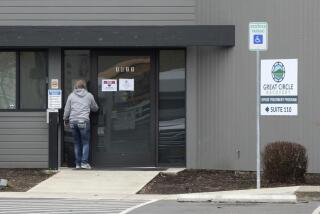The gray mood of Portland, Ore.: Like a character on ‘Grimm’
- Share via
PORTLAND, Ore. — On the set of “Grimm,” cast and crew can feel the waves of rain pelting the small building housing a few makeshift sets in an industrial neighborhood here. They’ll have to shoot outdoors later that night, and that gray-everyday atmosphere is very much a part of what defines the show.
“I love exterior stuff in the woods. I really do. It’s the most temperamental and physically uncomfortable, but it kind of does the scene for you,” says David Giuntoli, who plays Det. Nick Burkhardt, a descendant of the Grimm line of protectors who are fighting an unseen (by regular humans) battle against animalistic creatures called Wesen who mean to do us harm.
NBC’s supernatural procedural begins its fourth season as a steady performer, averaging 5.3 million viewers for the Oct. 24 debut, 15% more than last season’s finale despite going up against the World Series. The show is succeeding on Fridays, long thought of as a graveyard for TV shows since it was abandoned by “The X-Files” more than a decade ago.
“The show, in a way, was the little engine that could,” says executive producer David Greenwalt, one of the show’s creators. “Some of your colleagues in the media thought it wouldn’t last. I like that old ‘X-Files’ spot, Friday nights at 9. It’s almost a family show, as long as the kids are of a certain age. We’ve already sold into syndication with TNT, so we’re very happy with our position and the kudos we’ve received so far.”
Greenwalt produced “The X-Files” and “Buffy the Vampire Slayer”; “Grimm” co-creator Jim Kouf helped to shape “Ghost Whisperer” and, with Greenwalt, the “Buffy” spinoff “Angel.” That experience on the supernatural beat underscores the importance of tone for the show and in using Portland as a backdrop, “Grimm” has cast its most important ensemble member.
“We knew Portland,” Kouf says, “and we knew that the Grimm brothers fairy tales were mostly based in the Black Forest, so we wanted something that was similar — moody, with lakes and rivers and forests and all those things that we needed to give us the atmosphere that we wanted.”
The season begins on an uncertain plot note as Nick has lost the powers of a Grimm, among them enhanced strength, speed and the ability to see the Wesen even though they hide in human form — gifts that make him such a formidable foe to the creatures that wreak havoc on Portland. This season, according to Giuntoli, is about identity.
“Nick’s identity has totally changed — his whole purpose for being,” he said. “Season 1, he wanted nothing to do with being a Grimm. Seasons 2 and 3, he eased into it and started to own it. And finally, in Season 4, he gets what he wanted during Season 1. How does he deal with that? He mourns it.”
On one level Nick wants the powers back, but on another he’s happy to see them go. “Just because he lost his powers doesn’t mean he doesn’t know about the Wesen world,” Giuntoli says. “His friends are still in peril.”
On set, where a modern prison cell has been constructed a few feet from an Austrian medieval castle bedroom with tapestries and Renaissance-era paintings hanging from the wall, “Grimm’s” unique genre mixture is on full display. Other shows like ABC’s “Once Upon a Time” and Fox’s “Sleepy Hollow” may use the trope of storytelling through twisted — or realistic — versions of fairy tales, but Kouf notes that there are distinct differences.
“We think of our show as more psychological because we like to put a face to the monstrous behavior within human beings,” he says. “We’re telling the fairy tale version of real life. The monsters live within people. The Big Bad Wolf in the Grimm fairy tales could speak, so there must’ve been something that the Grimms were trying to warn people of.”
The other shows also don’t have Portland. The city offers incentives for productions, including cash payments of up to 16.2% of wages paid to production personnel. Those are just some of the benefits. Moody cloud cover, close proximity to a rain forest and different architecture aren’t as easily quantifiable. The city’s weather can be a wild card when shooting, but the ambience more than makes up for the logistical workarounds that the cast and crew often must conceive.
It can be a grind on people who have not grown up in the overcast Northwest. Russell Hornsby, who plays Nick’s partner, Hank Griffin, has learned over the last four seasons that it’s not for everyone.
“Working five days a week, 14 hours a day ... on your off time, you have to maintain a level of balance,” he says. “The elements, the grind sort of gets to you. You have to keep yourself in a positive frame of mind just to keep up the pace.”
Silas Weir Mitchell, who plays a Wesen blutbad (werewolf) creature named Monroe, reinforces the yin and yang of the weather and exterior filming.
“I love the rain, but no, shooting outside is different than liking it when it rains,” he says. “To be out in it for 12 hours, it just complicates everything. Everything takes longer, everybody’s got a little bit of a shorter fuse, everything’s covered in plastic and you have to wipe everything off, including the camera.”
Mitchell, who believes it’s “going to get darker” for his character, is often the go-to guy on set for German pronunciations of the weird Wesen that come to Portland.
“There’s a lot of weird ones coming at you,” says Greenwalt.
Mitchell and the actors see some positives from the show’s longevity.
“The externals — knowing where you’re going, how to get there, the locations when you’re not on stage, all that stuff, just makes it easier,” Mitchell says.
Cast and crew, at least outwardly, say they enjoy the unpredictable nature of their surroundings. Many wouldn’t have it any other way.
“We like an adventure,” Kouf says. “We think we’re telling an adventure every week, and adventures can’t always be told on a set.”
More to Read
The biggest entertainment stories
Get our big stories about Hollywood, film, television, music, arts, culture and more right in your inbox as soon as they publish.
You may occasionally receive promotional content from the Los Angeles Times.











